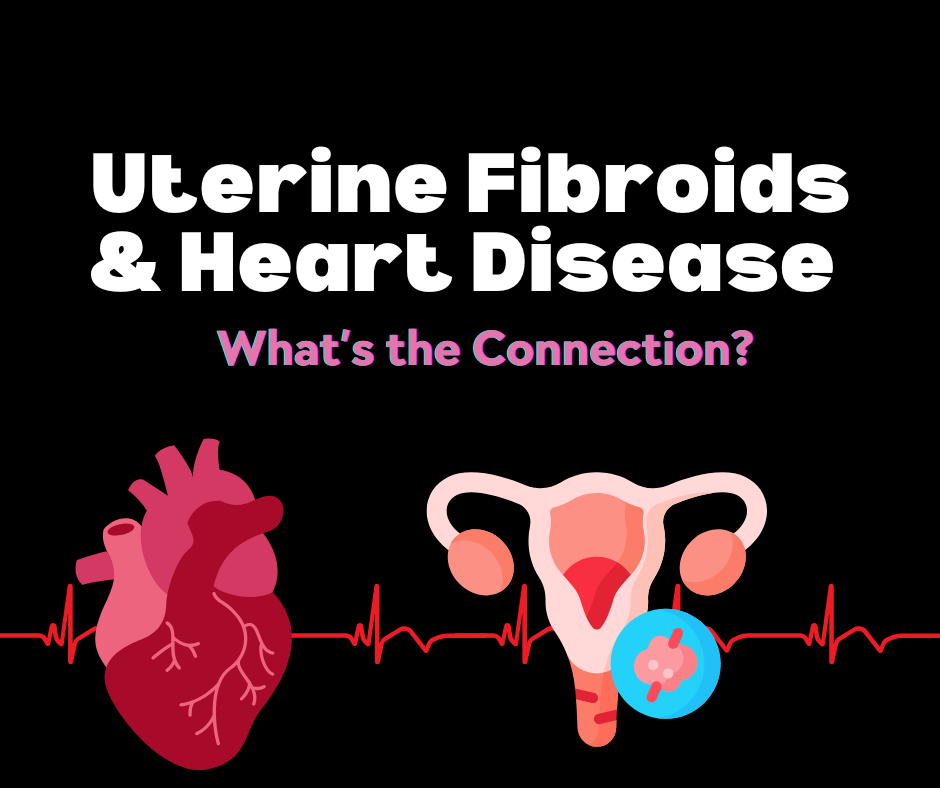
When discussing uterine fibroids, most conversations focus on heavy periods, pelvic pain, and bloating. But fibroids don’t just affect your uterus, they can impact your heart health as well.
The link between fibroids and heart disease is rarely discussed, but research shows it’s a serious concern. If you have fibroids and experience heavy bleeding, anemia, or high blood pressure, you must pay close attention to your cardiovascular health.
Let’s break down the connection between fibroids and heart disease, the risks you need to know, and the steps you can take to protect your heart.
What Are Fibroids and How Do They Affect Your Heart?
Uterine fibroids are non-cancerous tumors that grow in or around the uterus. They’re incredibly common, affecting up to 80% of women by age 50 ¹.
For some women, fibroids cause minimal symptoms. But for others, they can lead to heavy menstrual bleeding, severe anemia, and high blood pressure (hypertension) – all of which can increase the risk of heart disease.
Here’s the chain that often happens:
➡ Heavy menstrual bleeding → Iron-deficiency anemia
➡ Iron-deficiency anemia → Low oxygen levels in the blood
➡ Low oxygen levels → Increased heart rate & extra strain on the heart
➡ Long-term heart strain → Higher risk of heart disease, heart failure, and stroke
Women with severe fibroid-related anemia often report chronic fatigue, dizziness, and heart palpitations, which are also early warning signs of cardiovascular issues ².
Anemia & Heart Disease: The Fibroid Connection
Iron-deficiency anemia is a direct consequence of fibroid-related heavy bleeding, and it increases the risk of cardiovascular disease. Studies show that women with anemia are at a significantly higher risk of developing heart disease ³.
🔴 Anemia affects up to 20% of women of reproductive age ⁴.
🔴 Severe anemia can lead to heart failure if untreated.
🔴 Women with fibroids are more likely to experience iron-deficiency anemia due to prolonged heavy bleeding ⁵.
Anemia forces the heart to work harder, leading to palpitations, shortness of breath, dizziness, and extreme fatigue. If left untreated, chronic anemia can result in heart damage and an increased risk of stroke.
Hypertension (High Blood Pressure) & Fibroids: A Dangerous Pair
Studies show that women with fibroids are more likely to develop high blood pressure – a leading cause of heart disease ⁶.
- Women with fibroids are 2.3 times more likely to develop hypertension compared to women without fibroids.
- High blood pressure puts stress on the arteries, increasing the risk of heart attack, stroke, and heart failure.
One study found that hypertension may contribute to fibroid growth, creating a vicious cycle where fibroids and high blood pressure worsen each other ⁷.
If you have fibroids and high blood pressure, it’s critical to monitor your cardiovascular health.
Who’s Most at Risk?
Certain factors increase the risk of fibroids and heart disease occurring together:
✔ Women with heavy menstrual bleeding & anemia
✔ Women with a history of high blood pressure
✔ Perimenopausal women experiencing hormone fluctuations
✔ Black women, who are disproportionately affected by both fibroids & heart disease
It is imperative that women with fibroids not only make sure they’re keeping up with their gynecological visits, but also taking the steps to assemble a care team that includes a cardiologist.
Protecting Your Heart While Managing Fibroids
If you have fibroids, heavy periods, or anemia, here’s how you can protect your heart health:
💗 Get Your Iron Levels Checked: Ask your doctor to test ferritin and hemoglobin levels to check for anemia.
💗 Monitor Your Blood Pressure: High blood pressure is a silent killer. Regularly check your BP, especially if you’ve had prolonged anemia.
💗 Consider Fibroid Treatment Options: Non-invasive treatments can help shrink fibroids and reduce heavy bleeding, lowering your risk of anemia and heart strain.
💗 Eat an Iron-Rich Diet: Load up on leafy greens, lean meats, beans, and nuts to help restore iron levels.
💗 Don’t Ignore Symptoms: If you experience fatigue, heart palpitations, shortness of breath, or dizziness, talk to your doctor immediately.
Fibroids can negatively impact your cardiovascular system, but early intervention can reduce these risks.
The Bottom Line: Fibroids & Heart Health Are Linked
For too long, fibroids have been treated as just a reproductive health issue, but the reality is they can have widespread effects on the body, including the heart.
If you’re experiencing heavy bleeding, anemia, or high blood pressure, don’t ignore the symptoms. Protecting your heart health while managing fibroids is essential for long-term well-being.
This Go Red Day, help us raise awareness of the heart-health risks associated with fibroids and take steps to advocate for better care by sharing this information with your network.
Sources
[¹] Fibroid Foundation. “Fibroids 101.” https://www.fibroidfoundation.org/fibroids-101/
[²] American Heart Association. “Iron Deficiency and Heart Disease.” https://www.ahajournals.org/doi/10.1161/CIRCULATIONAHA.118.034720
[³] Journal of Women’s Health. “Anemia and Cardiovascular Risk.” https://www.ncbi.nlm.nih.gov/pmc/articles/PMC6161937/
[⁴] CDC. “Iron Deficiency Anemia.” https://www.cdc.gov/ncbddd/anemia/facts.html
[⁵] PLoS ONE. “Hypertension and Uterine Fibroids.” https://www.sciencedirect.com/science/article/abs/pii/S1553725013001780
[⁶] NIH. “Racial Disparities in Uterine Fibroids.” https://www.ncbi.nlm.nih.gov/pmc/articles/PMC4015116/
[⁷] PubMed. “Hypertension and Fibroid Growth.” https://pubmed.ncbi.nlm.nih.gov/30102523/
